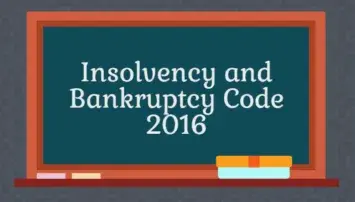Legal heir or Nominee? Who is the rightful owner?
 The Indian Judiciary has time and again been confronted with the contentious issue whether the rightful ownership of asset (including shares/securities, properties etc.) rests with the legal heir or nominee?
The Indian Judiciary has time and again been confronted with the contentious issue whether the rightful ownership of asset (including shares/securities, properties etc.) rests with the legal heir or nominee?
Disqualification of Directors: Penalty u/Section 164(2) of Companies Act not to apply Retrospectively
 The Hon’ble Delhi High Court on November 04, 2019, clarified the position on disqualification of directors in the case of Mukut Pathak and Ors. v. Union of India and anr.
The Hon’ble Delhi High Court on November 04, 2019, clarified the position on disqualification of directors in the case of Mukut Pathak and Ors. v. Union of India and anr.
Intermediary Liability: SC says Intermediaries not Protected under Section 79 of IT Act
 The Hon’ble Supreme Court vide its judgement dated December 10, 2019, has clarified the position of intermediaries under Section 79 of the Information Technology Act, 2000 (hereinafter referred to as ‘Act’) prior to its amendment.
The Hon’ble Supreme Court vide its judgement dated December 10, 2019, has clarified the position of intermediaries under Section 79 of the Information Technology Act, 2000 (hereinafter referred to as ‘Act’) prior to its amendment.
Key Highlights of Insolvency and Bankruptcy (Second Amendment) Bill, 2019
 The Union Cabinet on December 11, 2019 approved the amendment to the Insolvency and Bankruptcy Code, 2016 (hereinafter referred to as ‘IBC’) and the same was introduced in the Lok Sabha on December 12, 2019.
The Union Cabinet on December 11, 2019 approved the amendment to the Insolvency and Bankruptcy Code, 2016 (hereinafter referred to as ‘IBC’) and the same was introduced in the Lok Sabha on December 12, 2019.
Legal heir or Nominee? Who is the rightful owner?

By Nihit Nagpal and Nishtha Das
Legal Heir v. Nominee
The Indian Judiciary has time and again been confronted with the contentious issue whether the rightful ownership of asset (including shares/securities, properties etc.) rests with the legal heir or nominee? The obscurity pertaining to this legal aspect has compelled nominees and legal heirs to knock the doors of justice which has resulted in settling the legal principle that nominees only hold the assets on behalf of the legal heirs of the deceased and that mere nomination of shares does not amount to beneficial ownership of an asset.
What does the law say?
The provisions governing the law relating to nomination of shares and the power to nominate are enumerated under the Companies Act.
Nomination of Shares- Section 109A of the Companies Act, 1956 provides for the nomination of shares and states that where a nomination made in the prescribed manner purports to confer on any person the right to vest the shares in, or debentures of, the company, the nominee shall, on the death of the shareholder become entitled to all the rights in the shares or debentures of the company to the exclusion of all other persons, unless the nomination is varied or cancelled in the prescribed manner. Section 109B of the Companies Act provides for transmission of shares.
The statutory provisions under Section 109A and B were elaborately discussed by the Division Bench of the High Court of Bombay in the case of Shakti Yezdani v. Jayanand Jayant Salgaonkar , wherein the Court while interpreting the provisions was of the view that the nominee of a holder of shares or securities appointed under Section 109A of the Companies Act, 1956 is not entitled to the beneficial ownership of the shares or securities subject matter of nomination to the exclusion of all other persons who are entitled to inherit the estate of the holder as per the law of succession. Thus, the High Court held that nomination does not override the law in relation to testamentary or intestate succession. The provision regarding nomination are made with a view to ensure that the estate or the rights of the deceased subject matter of the nomination are protected till the legal representatives of the deceased take appropriate steps .
Judiciary’s Stance
Recent order by NCLAT- rightful ownership of shares remains with the legal heir and not the nominees-Oswal Greentech v. Mr Pankaj Oswal and Ors.[1]
Brief facts: In this case, the deceased namely Mr. Abhay Oswal held majority shares in Oswal Agro Mills Limited. The deceased had filed nomination in favour of one, Mrs. Aruna Oswal (nominee). After the death of deceased, the nominee filed request for registration of the impugned shares in her favour and the Company accordingly transferred the shares in the name of nominee. Thereafter, Mr. Pankaj Oswal (hereinafter referred to as ‘legal heir/ representative’), approached the National Company Law Tribunal (‘NCLT’) and contended that the transfer of shares to the nominee was in contravention of the law. The NCLT considering the above, held that the petition was maintainable. Aggrieved by the decision of the NCLT, the Company approached the NCLAT.
NCLAT’s order: The NCLAT passed an order in favour of the legal heir to hold that the shares of the deceased ultimately vest with the legal heir. The nominee appointed by the deceased is in possession of the shares only till the ownership is not transferred to the legal heir.
“The right arising out of an instrument does not vest with nominee automatically on the death of the original holder of the instrument. Nominee does not mean that the amount or the share belongs to the nominee. On the death of the holder of the instrument, the amount/ share vests with the legal heirs, the nominee merely holds the amount/ share herein till the matter of vesting is decided in favour of the legal heirs.”
It was further noted by the Appellate Tribunal that nominees only hold the assets on behalf of the legal heirs of the deceased and that mere nomination of shares does not amount to beneficial ownership of an asset.
The Courts have time and again reiterated that the legal heir and not the nominees have the rightful position to obtain ownership of the assets of the Deceased. In another case of Smt. Sarbati Devi and Anr. V. Smt. Usha Devi, the Hon’ble Supreme Court has held that a nomination cannot be given the same position as that of a will. Nomination and will are two different concepts and nomination could not be given the same legal status as that of a will. A nominee could not be considered as owner of a property. Mere nomination does not bestow beneficial ownership of assets to the nominees.
Other similar judgments on the issue are Uma Sehgal and Ors. vs Dwarka Dass Sehgal And Ors. , wherein the High Court of Delhi remarked that a nominee is nothing but a person who receives the payment on behalf of the heirs of the assured. Similarly in the case of Shipra Sengupta vs Mridul Sengupta & Ors. , the Supreme Court held that the amount in any head can be received by the nominee, but the amount can be claimed by the heirs of the deceased in accordance with law of succession governing them. In other words, nomination does not confer any beneficial interest on the nominee.
Exceptions to the Rule
Laws of Insurance– In catena of cases, it has been held by different High Courts that under Section 39 of the Insurance Act, the nominee is nothing more than an agent to receive the money due under the life insurance policy and that the money as such received remains the property of the assured during his life time and on his death forms part of his estate subject to the law of succession applicable to him .
However, the Legislature enacted the Insurance Law (Amendment) Act, 2015 which while altering the earlier settled position under the Laws of Insurance states that where a policyholder dies after the maturity of the policy but the proceeds and benefit of his policy has not been made to him because of his death, in such a case, his nominee shall be entitled to the proceeds and benefit of his policy .
RBI Circular- The Reserve Bank of India’s Master Circular on Nomination facility for Relief/Savings bonds provides that a the holder of a Relief/Savings bond, may nominate one or more persons who in the event of death of the holder would be entitled to the Relief/Savings bond and to the payment thereon.
Key Take Away
The highly speculated law has been set to rest by the decision of the Courts and Tribunals and it is now abundantly clear that the legal heir is the rightful owner of property of deceased and that the nominee only holds the property “in trust” and that the legal heir is free to make a claim over the property against the nominee.
However, many a times the concept of nomination in matters of inheritance and succession leads to misunderstanding, on account of which nominees often end up making wrong claims of ownership of property of the deceased. In order to avoid such conflicts within the family it is always recommended that a person has a well planned Will in which he/she clearly sets out the terms of succession and nomination.
[1] Company Appeal (AT) No 410 of 2018
Disqualification of Directors: Penalty u/Section 164(2) of Companies Act not to apply Retrospectively

By Rupin Chopra and Reetika Wadhwa
The Hon’ble Delhi High Court on November 04, 2019, clarified the position on disqualification of directors in the case of Mukut Pathak and Ors. v. Union of India and anr.[1] This judgment has come in resonance with other similar judgements passed by Hon’ble High Courts of Gujrat, Madras and Karnataka, on Section 164(2)(a) of the Companies Act, 2013 (hereinafter referred to as ‘Act’).
What does Section 164(2)(a) of Companies Act say?
Section 164(2)(a) of the Act deals with the disqualification of directors. It states that when a company has not filed financial statements or annual returns, for any three consecutive years, it will result in the disqualification of its directors for a period of five years.
Brief facts –
- Directors of various companies had collectively approached the Hon’ble Delhi High Court upon their disqualification from being appointed/reappointed as directors by the Ministry of Corporate Affairs (hereinafter referred to as ‘MCA’).
- As the companies had failed to file financial statements or annual returns the past three years, the directors were disqualified under Section 164(2)(a) of the Act.
- Following which, the directors sought directions to be issued to the MCA for reinstating their qualification as directors.
Observations made by the Hon’ble Delhi High Court –
- The significant question that arose before the Hon’ble High Court is whether the disqualification of directors under Section 164(2) of the Act is to be applied retrospectively? The Act came into force w.e.f. April 01, 2014, and the financial statements or annual returns considered for the directors disqualifications were of Financial Year 2013-2014.
- It is well settled that no statute shall be construed to apply retrospectively, unless such a construction appears clear from the language of the enactment or otherwise necessary by implication. It was also equally agreed that a statute is not retrospective merely because it affects existing rights or because a part of the requisites for its action is drawn from a time antecedent to its passing.
- The court rejected the claim of the directors by opining that non-filing of financial statements or annual returns was already prohibited under the Companies Act, 1956. Therefore, when the same prohibition was envisaged under Section 164 of the Act, the retrospective application of the same has no significant adverse effect on the rights of the defaulting companies.
- Therefore, the Court held that Section 164(2) of the Act operates prospectively. However, such prospective operation would entail taking into account failure to file the financial statements or annual returns pertaining to the Financial Year ending March 31, 2014 on or before October 30, 2014. The penalty under Section 164(2) of the Act would not extend to defaults committed prior to April 01, 2014.
- In this regard, the Hon’ble Supreme Court, also directed the Respondents to reactivate the DIN and DSC of the petitioners. While doing so, the Court noted that the Central Government having framed the rules specifying the conditions in which a DIN may be cancelled, cannot cancel the same on any other ground and without reference to such rules.
The Delhi High Court has now clarified the position of Section 164 (2) of the Act regarding the provisions of disqualification of directors. The Hon’ble Court observed that Section 164 (2) of the Act can apply to failure for not filing returns for Financial Years prior to 2014, the year in which the said section came into force. While aligning with the High Courts of Madras, Gujrat and Karnataka, the Hon’ble Delhi High Court has now reinstated that operation of the Section 164(2) in the present case, does not amount to retrospective application of a penal provision.
To know more about Company Laws click here.
[1] W.P.(C) 9088/2018 &CM Appln. No.35006/2018
Intermediary Liability: SC says Intermediaries not Protected under Section 79 of IT Act

By Priya Adlakha and Tulip De
The Hon’ble Supreme Court vide its judgement dated December 10, 2019, has clarified the position of intermediaries under Section 79 of the Information Technology Act, 2000 (hereinafter referred to as ‘Act’) prior to its amendment. The Hon’ble Supreme Court addressed the aforesaid issue in the matter of Google India Pvt. Ltd. v. Vishakha Industries and anr.[1]
As per Section 79 of the Act which states the exemption of liability for intermediaries under certain instances. An intermediary shall not be liable for any third party information or data made available by it or hosted by it. Intermediaries can be online platforms (like Google in this case) that facilitate information.
The Act extends “safe harbor protection” only to those instances where the intermediary merely acts a facilitator and is not involved in creation or modification of the data or information.[2]
Prior to the amendment, in the Act in 2009, the protection to intermediaries was applicable only for the provisions of the Act. It was only after the aforesaid amendment that an umbrella protection was provided to the intermediaries. The present case relates to the position of intermediaries before the amendment when they were not to be made liable only under the Act and the exemption of liability did not extend to other Acts.
Brief Facts –
- Vishakha Industries (hereinafter referred to as ‘company’) was engaged in the manufacture of asbestos. In the year 2009, the company filed a criminal defamation case against an individual who was publishing articles under the name ‘Ban Asbestos’ in a group.
- Google was involved in hosting the group by way of Google Group services provided by it and was made a party to the defamation case. The company alleged that Google failed to take down the article even after multiple requests of the company.
- Thereafter, Google approached the High Court of Andhra Pradesh to quash the complaint against it as it was an intermediary under Section 79 of the Act and was not liable for the publications made in the group.
- The Hon’ble High Court rejected the plea of Google, stating that being an intermediary, it failed to take an action to bring down the defamatory posts. Therefore, it could not claim exemption under Section 79 of the Act.
- Google subsequently filed an appeal before the Hon’ble Supreme Court.
Observations by the Supreme Court –
- The Hon’ble Supreme Court stated that the matter had to be decided in accordance with the provisions applicable prior to the amendment made.
- Additionally, the Hon’ble Court explained the inapplicability of the exception of ‘actual knowledge’. As per Section 79 (3) (b) of the Act, the exemption of intermediaries from liability could be waived if such intermediary even upon receiving ‘actual knowledge’ of the content being unlawful, did not take it down.
- To reinstate the above, the Hon’ble Court referred to the definition of ‘actual knowledge’ given in the Shreya Singhal case[3]. In the aforementioned case, ‘actual knowledge’ was to mean an order from the court or competent authority.
- The Hon’ble Court finally held prior to its substitution, Section 79 did not provide protection to intermediaries. Hence, Google, as an intermediary, cannot be exempted from the liability arising out of defamation.
- Consequently, the Hon’ble Court rejected Google’s plea claiming immunity from liability as intermediary. Accordingly in the present case, Google will undergo trial in the above criminal defamation case.
Conclusion –
After the amendment in Section 79 of the Act, intermediaries are provided a comprehensive protection to any liability arising from publications or information made available by it. The purpose to provide exemption of liability helps the intermediary to operate without any intervention. However, in the above case, Google could not get any exemption from liability as the defamation case was made before the amendment when exemption extended only for the provisions under the Act. The above case clears the air upon the position of intermediaries prior to the amendment of Section 79 of the Act.
Related Posts
Intermediaries under the Information Technology Act, 2000 in India
Online Copyright Infringement and Its liability Upon Intermediary in India
Regulation of Intermediaries under Information Technology Act, 2000
India: Intermediary’s Liability for Infringing Content
[1] Cr. Appeal No. 1987 of 2014
[2] https://www.rna-cs.com/liability-of-intermediaries-under-information-technology-act-2000/
[3] Writ Petition (Criminal) No. 167 of 2012.
Key Highlights of Insolvency and Bankruptcy (Second Amendment) Bill, 2019

The Union Cabinet on December 11, 2019[1] approved the amendment to the Insolvency and Bankruptcy Code, 2016 (hereinafter referred to as ‘IBC’) and the same was introduced in the Lok Sabha on December 12, 2019. The amendment aims at streamlining issues of troubled companies, protect corporate debtors and prevent unnecessary revocation of insolvency proceedings under the IBC.
The amendment also intends to provide protection to a corporation from criminal proceedings against offences committed by previous management or promoters. Additionally, it also provides a faster revival process for stressed companies.
Key Highlights of the Bill –
- Proviso to Clause (12) of Section 5 of the Code has been omitted to clarify that the insolvency commencement date is the date on which an application for initiating Corporate Insolvency Resolution Process (hereinafter referred to as ‘CIRP’) is admitted.
- Section 7 of the Code has been amended to clarify minimum threshold for certain classes of financial creditors for initiating CIRP. It states that an application for initiating CIRP shall be filed jointly by not less than 100 of such creditors in the same class or not less than 10% of the total number of such creditors in the same class, whichever is less. For financial creditors who are allottees under a real-estate project, an application for initiating CIRP shall be filed jointly by not less than one hundred of such allottees under the same real estate project or not less than 10% of the total number of such allottees under the same real estate project, whichever is less.
- Section 11 of the Code has been amended to clarify that a corporate debtor shall not be prevented from initiating CIRP against any other corporate debtor.
- Section 14 of the Code has been amended to put a stay on the licenses, permits, concessions, clearances etc. of the corporation. The above cannot be terminated, suspended or not renewed on the grounds of insolvency during the moratorium period. Additionally, the supply of goods and services critical to preserve and protect the value of the corporate debtor, such supply shall not be terminated.
- Section 16 of the Code has been amended to provide that an insolvency resolution professional should be appointed on the date of admission of the application for initiation of CIRP.
- Section 23 of the Code has been amended to enable the resolution professional to manage the affairs of the corporate debtor during interim period between the expiry of CIRP till the appointment of a liquidator;
- A new Section 23A has been inserted to provide that the liability of a corporate debtor for an offence committed prior to the commencement of the CIRP shall cease under certain circumstances.
Effects of the amendment
The amendment brings the much awaited changes needed in the insolvency sector. It clears the air on various aspects and provides relief to both corporate debtor as well as the creditors. The thresholds introduce will prevent admission of unnecessary cases to the insolvency court. However, even after anticipation, cross border insolvency framework has not been included in the amendment. Now, the same is expected to get cleared in the next session.
Related Posts
Proposed Key changes in the Insolvency and Bankruptcy Code (IBC) in 2019
IBBI strengthens norms over Insolvency Resolution Professionals (IRP’s)
[1] https://pib.gov.in/newsite/PrintRelease.aspx?relid=195770


